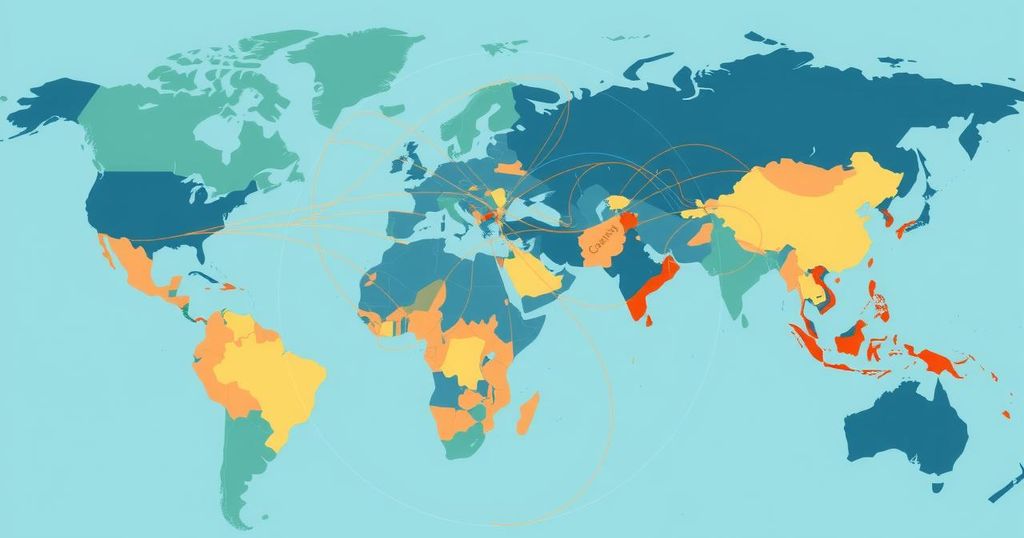Global news
AN, ASIA, BRAZIL, CANADA, CHINA, COMMERCE INDUSTRY, EU, EUROPEAN UNION, GEOPOLITICS, INDIA, INTERNATIONAL RELATIONS, JAISHANKAR, MALAYSIA, MEXICO, MODI, NARENDRA MODI, NORTH AMERICA, OBSERVER RESEARCH FOUNDATION, ORF, PHILIPPINES, SOUTH AMERICA, TARIFFS, TRADE, TRUMP, UNION MINISTER OF COMMERCE AND INDUSTRY, US
Isaac Bennett
0 Comments
Trump’s Tariff Focus and Geopolitical Challenges: Insights from Dhruva Jaishankar
Dhruva Jaishankar noted that Trump’s tariff focus is mainly on Canada, Mexico, China, and the EU, with India slightly exempt. He discussed trade negotiations and the hope for an interim agreement before April 2. Jaishankar highlighted the Raisina Dialogue’s role as a positive global platform for discussing crucial issues. Additionally, he addressed the potential for India to mediate in the Russia-Ukraine conflict and outlined significant challenges facing the Global South.
Dhruva Jaishankar, Executive Director of the Observer Research Foundation, indicated that President Trump’s tariff priorities predominantly include Canada, Mexico, China, and to a lesser extent, the European Union, while India notably remains somewhat exempt. Jaishankar expressed concerns about the potential impacts of upcoming global reciprocal taxes announced by Trump shortly before his meeting with Indian Prime Minister Modi. He highlighted that India’s tariffs are significantly higher than those of the United States, suggesting that India, along with countries like Malaysia and Brazil, could face adverse effects.
Jaishankar elaborated on the recent discussions held by India’s Commerce and Industry Minister, Piyush Goyal, with the US Trade Representative, conveying optimism for an interim trade agreement prior to the April 2 deadline. He noted the importance of reaching a longer-term arrangement by September or October to stabilize US-India relations, emphasizing the potential for reciprocal tariff responses. Jaishankar expressed cautious optimism, referencing Trump’s past willingness to reconsider decisions at the last moment.
During the Raisina Dialogue, which commenced on March 17, Jaishankar hailed its significance as a global forum, stating that it now involves over 4,000 delegates from more than 100 countries and includes 100 sessions. He pointed out the constructive and positive tone of discussions at Raisina, contrasting it with the confrontational nature of events like the Munich Security Conference. Key topics of this year’s dialogue include connectivity, trade, and responses to geopolitical changes impacting regions like Russia, Ukraine, the Middle East, and the Indo-Pacific.
Regarding the Russia-Ukraine conflict, Jaishankar reported that Ukraine has proposed terms for a ceasefire, leaving the next steps contingent upon Russia’s response amidst forthcoming discussions between Trump and President Putin. He stressed that the focal point is not merely territorial boundaries but rather the conditions that will define Ukraine’s status going forward, while also noting global expectations of reduced US involvement.
Jaishankar pointed out India’s potential role in facilitating dialogue in the Russia-Ukraine context. He indicated that while Saudi Arabia has thus far taken the lead in mediating discussions, India remains available to assist should both involved parties seek its involvement. He emphasized the importance of being prepared for an ongoing dialogue regarding the peace process, especially considering recent attempts at ceasefire agreements.
When discussing challenges confronting the Global South, Jaishankar identified three pivotal issues: institutional reform, health and food security exacerbated by recent global crises, and climate justice. He expressed that the needs of the Global South, particularly in the context of broader institutional frameworks, appear to be underrepresented, and he is interested in how these dynamics may shift with varying US engagement levels.
In summary, Dhruva Jaishankar’s remarks reflect pivotal concerns regarding US tariffs, trade negotiations, and their implications for India, particularly in light of the reciprocal tax announcements. The Raisina Dialogue appears to foster a productive environment for discussing global issues, while the tumultuous Russia-Ukraine conflict continues to raise questions about peace processes where India could potentially mediate. Additionally, the challenges faced by the Global South highlight the need for more inclusive global governance and focused attention on pressing issues such as health and climate change.
Original Source: www.business-standard.com




Post Comment